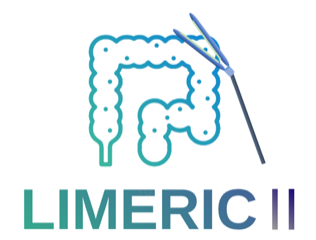Large or complex colon polyps are in general removed with advanced endoscopic resection techniques such as endoscopic mucosal resection (EMR), endoscopic submucosal dissection (ESD) and endoscopic full-thickness resection (eFTR). However, not all colonic lesions are eligible to be removed by these minimal invasive endoscopic techniques because of their size, morphology or difficult approachable location. As a result, a large proportion of patients is still referred for a segmental colon resection, which is known to be associated with complications in 25% of all patients and a mortality rate of 1-2%. Therefore, we introduced the colonoscopic-assisted laparoscopic wedge resection (CAL-WR) by using a linear stapler without anastomosis for the treatment of such polyps.
In the prospective multicenter LIMERIC-study (Annals of Surgery 275-5:p 933-939, May 2022), it was demonstrated that CAL-WR is a safe and feasible technique for the resection of colonic polyps not amenable to conventional endoscopic resection. CAL-WR has a low morbidity rate, with only 6% minor complications, a high technical success rate (93%) and a radical resection rate of 91%.
Subsequently, CAL-WR was introduced as a feasible ‘’full-thickness’’ resection technique for the removal of suspected T1 colon carcinomas (Annals of Surgical Oncology January 2023). In particular for large deep-invasive lesions, CAL-WR could fill the gap between the current endoscopic resection techniques and major oncologic surgery, providing more patients an minimal invasive organ-preserving treatment option.
CAL-WR is a promising local resection technique for both superficial and deep-invasive T1 colon cancer; however, its long-term oncological outcomes are not yet known. Therefore, a large, prospective, multicenter study (the LIMERIC-II) has currently started in the Netherlands, which will provide more insight in the long-term oncological outcomes, patients burden, as well as costs.
For more information about the LIMERIC or LIMERIC-II study, including study-related resources (protocol, patient information per site), please click on the relevant study.
Related articles:
Colonoscopy-Assisted Laparoscopic Wedge Resection for the Treatment of Suspected T1 Colon Cancer.
Julia Hanevelt MD, Leon M. G. Moons MD, PhD, Judith E. K. R. Hentzen MD, PhD, Tess M. Wemeijer MD, Jelle F. Huisman MD, Wouter H. de Vos tot Nederveen Cappel MD, PhD & Henderik L. van Westreenen MD, PhD
Colonoscopic-assisted laparoscopic wedge resection for colonic lesions: A prospective multicentre cohort study (LIMERIC-study).
Laura W. Leicher, Jelle F. Huisman, Wilhelmina M.U. van Grevenstein, Paul Didden, Yara Backes, G. Johan A. Offerhaus, Miangela M. Laclé, Freek C.P. Moll, Joost M.J.Geesing, Niels Smakman, Jochim S. Terhaar Sive Droste, Emiel G.G. Verdaasdonk, Frank ter Borg, A. Koen Talsma, G. Willemien Erkelens, Edwin S. van der Zaag, Ruud W.M. Schrauwen, Bob J. van Wely, Ingrid Schot, Maarten Vermaas, Jeroen D. van Bergeijk, Colin Sietses, Wouter L. Hazen, Dareczka K. Wasowicz, Dewkoemar Ramsoekh, Jurriaan B. Tuynman, Yasser A. Alderlieste, Rutger-Jan Renger, Frank A. Oort, Ernst Jan Spillenaar Bilgen, Frank P. Vleggaar, Hans F.A. Vasen, Wouter H. de Vos tot Nederveen Cappel, Leon M.G. Moons, Henderik L. van Westreenen
Limited Endoscopic-Assisted Wedge Resection for Excision of Colon Polyps
Laura W. Leicher, M.D. • Wouter H. de Vos tot Nederveen Cappel, M.D., Ph.D. Henderik L. van Westreenen, M.D., Ph.D.


